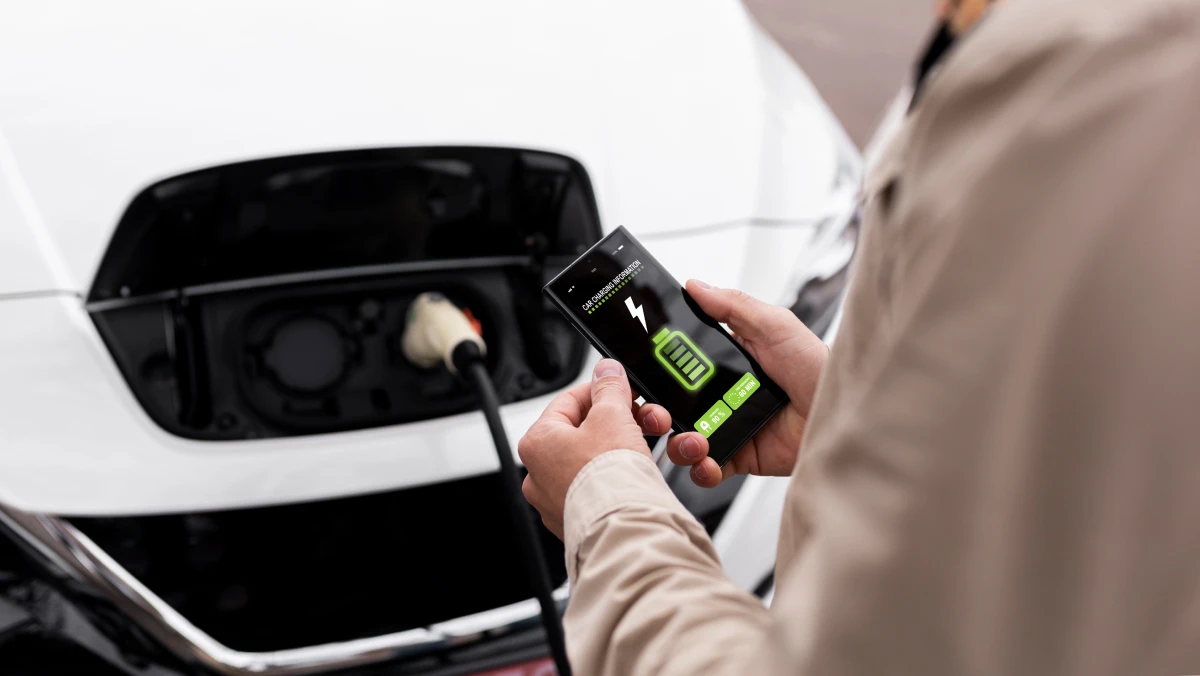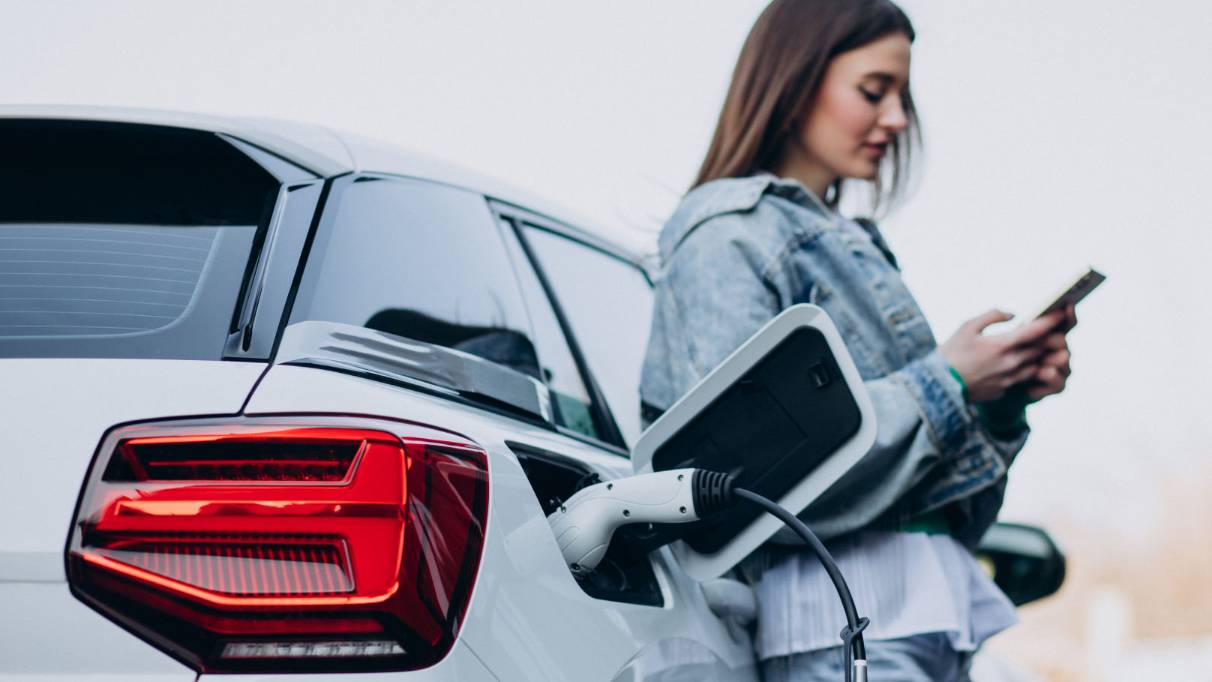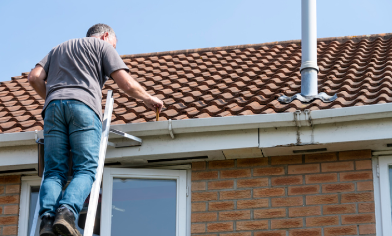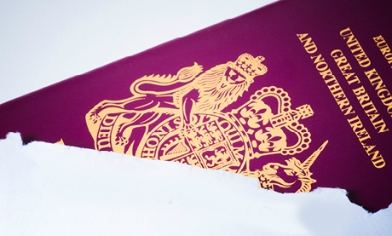The future is electric
It’s clear that greener transport is on the rise – but why are so many drivers going electric?
For starters, electric vehicles, or EVs, produce no emissions, which is better for the environment. Hybrid cars, which have both an electric motor and a traditional engine, also help by using less fuel than petrol or diesel cars. This makes them a great choice if you want to be more eco-friendly.
EVs and hybrids are also cheaper to run. Charging an EV typically costs less than filling up a petrol or diesel car. On top of that, you can also get perks like government grants when you choose an electric or hybrid vehicle.
And with more available charging points and better battery technology, EVs and hybrids are easier than ever to use in daily life. But what about car insurance?
Are electric vehicles more expensive to insure?
Yes, electric vehicles usually cost more to insure than petrol or diesel cars. That’s because EVs have special parts, like batteries, which can be expensive to repair or replace. You’ll also need to visit a specialist garage or mechanic for repairs, which can add to the cost.
But don’t forget, electric and hybrid vehicles could save you money in the long run with lower fuel and maintenance costs. They’re also better for the environment and can help reduce your carbon footprint.
As electric cars become more common, insurers are beginning to offer more competitive prices. If you're thinking about getting an electric or hybrid car, it’s a good idea to compare all the costs to make sure it’s the right choice for you.
What’s included in electric and hybrid vehicle car insurance?
Electric and hybrid vehicle insurance is like regular car insurance but has some extra features to suit these types of vehicles. Here’s what’s usually included:
- Battery cover: This protects your battery from theft or damage. Some policies also cover accidental damage while charging, which can be useful if something unexpected happens
- Charging equipment cover: Covers your home charging points and cables if they’re damaged or stolen. This can be handy for keeping your setup at home in safe and working
- Breakdown assistance: If your car runs out of charge, breakdown cover can help. Post Office car insurance lets you add on breakdown cover which covers EVs and hybrids
Some policies also come with other extras, such as a replacement car while yours is being fixed or using recycled parts for repairs. Every policy is different, so it’s a good idea to compare them and check what’s included.
What can affect electric and hybrid vehicle premiums?
Electric and hybrid vehicles insurance premiums are worked out in a similar way to traditional cars, but there’s a few things which can make it more expensive. Many standard considerations, such as driver details and driving history, still apply but electric and hybrid vehicles also come with unique cost influences. Here’s are some key factors that can impact your premiums:
- Car value: Electric and hybrid vehicles tend to cost more than petrol or diesel cars. This can mean higher repair or replacement costs, which can affect your premiums
- Battery repairs: The battery is one of the most expensive parts of an EV, and repairing or replacing it can push up your premiums
- Specialist repairs and parts: EVs often need mechanics with special training and unique parts, which can add to the overall cost of your insurance
- Driving habits: How you use your car matters. Things like how many miles you drive, where you park and whether you use your EV or hybrid for work can all influence your premiums
- Driver details: Your age, driving history, and no-claims bonus can also make a difference in how much you pay
Understanding these factors can help you make informed decisions and find the right insurance at the best price.

How can you help lower your EV or hybrid insurance premiums?
There are a few ways you could help cut the cost of your premiums, such as:
- Installing a tracker: Adding a tracking device could make it easier to recover your car if it’s stolen, which can help reduce your premiums
- Parking securely: Parking in a garage or secure area lowers the risk of theft or damage, which could mean cheaper insurance
- Increasing your voluntary excess: Agreeing to pay a bit more if you need to make a claim can help lower your premiums, but make sure you can afford it if something happens
- Taking a driving course: Completing an EV or hybrid driver training course can sometimes get you a discount since it shows your commitment to safe driving
- Comparing policies: With more insurers covering EVs now, it’s worth shopping around and comparing different policies to help you find the best deal
What is electric van insurance?
In the UK, if you own an electric van for personal use, you must have insurance. Standard van insurance covers the basics, but some policies also protect things like batteries, charging cables and home charging points.
If you drive an electric van provided by your employer, they might add you as a named driver to their existing business van insurance. If they don’t, you’ll need to get your own insurance.
If you own and use an electric van for work that isn’t provided by an employer, you’ll need business van insurance. This will cover work-related tasks like delivering goods or visiting clients.
What’s included in EV business van insurance?
Business van insurance for electric vans usually includes:
- Battery protection: Covers damage, theft or fire affecting the battery, whether you own or lease it
- Charging equipment: Protects charging cables, and home or workplace charging points from damage or theft
- Goods-in transit insurance: Covers items you’re transporting for work if they’re lost, damaged or stolen
- Public liability insurance: Covers injury or property damage caused by your van while you’re working
- Breakdown recovery: Includes towing to a charging station if your van’s battery runs out
- Tool and equipment cover: Protects work tools or equipment stored in your van
The right insurance keeps you covered, whether you own the van, drive one for your employer or have your own business. Just make sure your policy matches how you use the van to avoid any surprises.
Key takeaways
- Electric and hybrid car and van insurance often includes extra features. It might cover expensive parts like batteries and charging equipment. Some policies also include breakdown help for EVs
- Insurance for electric or hybrid cars and vans can cost more than for petrol or diesel vehicles. This is because EVs and hybrids are more expensive to fix, especially the battery. You can lower costs by using trackers, parking in safe places and comparing policies to find the best deal
- The right insurance protects you from surprise costs. Whether you drive an EV, hybrid car or van for personal use or work, the right cover makes sure you're protected. It can save you from paying for expensive repairs out of pocket if you have a valid claim













